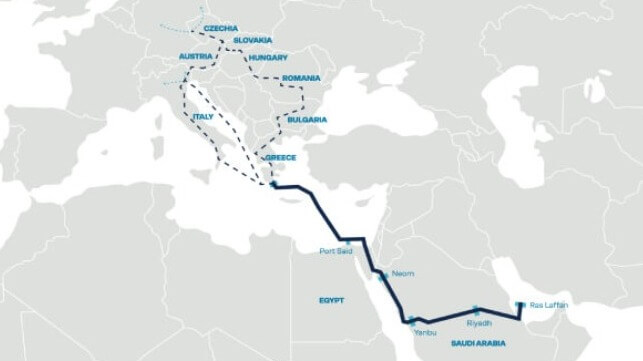RINA Releases Ambitious Proposal for H2 Pipeline From Mideast to EU

Italian class society RINA has completed a study on a remarkable engineering proposal: it has laid out the steps needed to build a hydrogen pipeline stretching all the way from Ras Laffan, Saudi Arabia to southern Greece, connecting a promising green- and blue-hydrogen producer with the most advanced market for zero-carbon fuels.
In conjunction with engineering consultancy AFRY, RINA carried out an initial study to examine ways to link up Gulf hydrogen with European energy consumers without the intermediate steps required for maritime transport. Hydrogen is challenging to ship over long distances because of its low energy density and special handling requirements; it can also be chemically transformed into ammonia or methanol, or dissolved in a solvent, but these steps reduce round-trip energy efficiency. A pipeline would allow the gas to be transported continuously, without liquefying it or turning it into another chemical first.
"The discussion around exporting hydrogen and its synthesis products from the Gulf to Europe is currently revolving around molecule transport by ship. These options receive EU subsidies and drive activity within the gas/hydrogen industry, but they may not be most efficient for bulk transport," argued RINA.
The class society's analysis found that the right pipeline setup could transport about 2.5 million tonnes of hydrogen annually. If this level of ambition needed to be raised, parallel pipelines could be added to scale up capacity. For scale, Saudi Arabia's overall target for the production of clean hydrogen (green plus blue) is four million tonnes per year by 2035.
The cost of transport would come to about $1.30 per kilo of H2, bringing the delivered price of clean hydrogen from the Gulf to about $2.50 per kilo. This is on the lower end of the range for the International Energy Agency's price estimate for renewable-based H2.

that matters most
Get the latest maritime news delivered to your inbox daily.
Geopolitical risks are a core concern for any transnational energy project of this scale, but the routing for the line would pass through a relatively small number of nations - Saudi Arabia, Egypt and Greece. RINA noted the proposed EastMed pipeline project from Israel to Cyprus to Greece, which failed after Turkey protested Cypriot involvement; the rough outline of the route for the proposed H2 pipeline appears to pass southeast of Cypriot waters.
"The findings of the study represent a decisive contribution to boost the hydrogen economy. Together with AFRY, we have identified a potential stable corridor to bring supply and demand together. The scale-up of hydrogen adoption goes through projects like this," said Andrea Bombardi, Executive Vice President at RINA.
